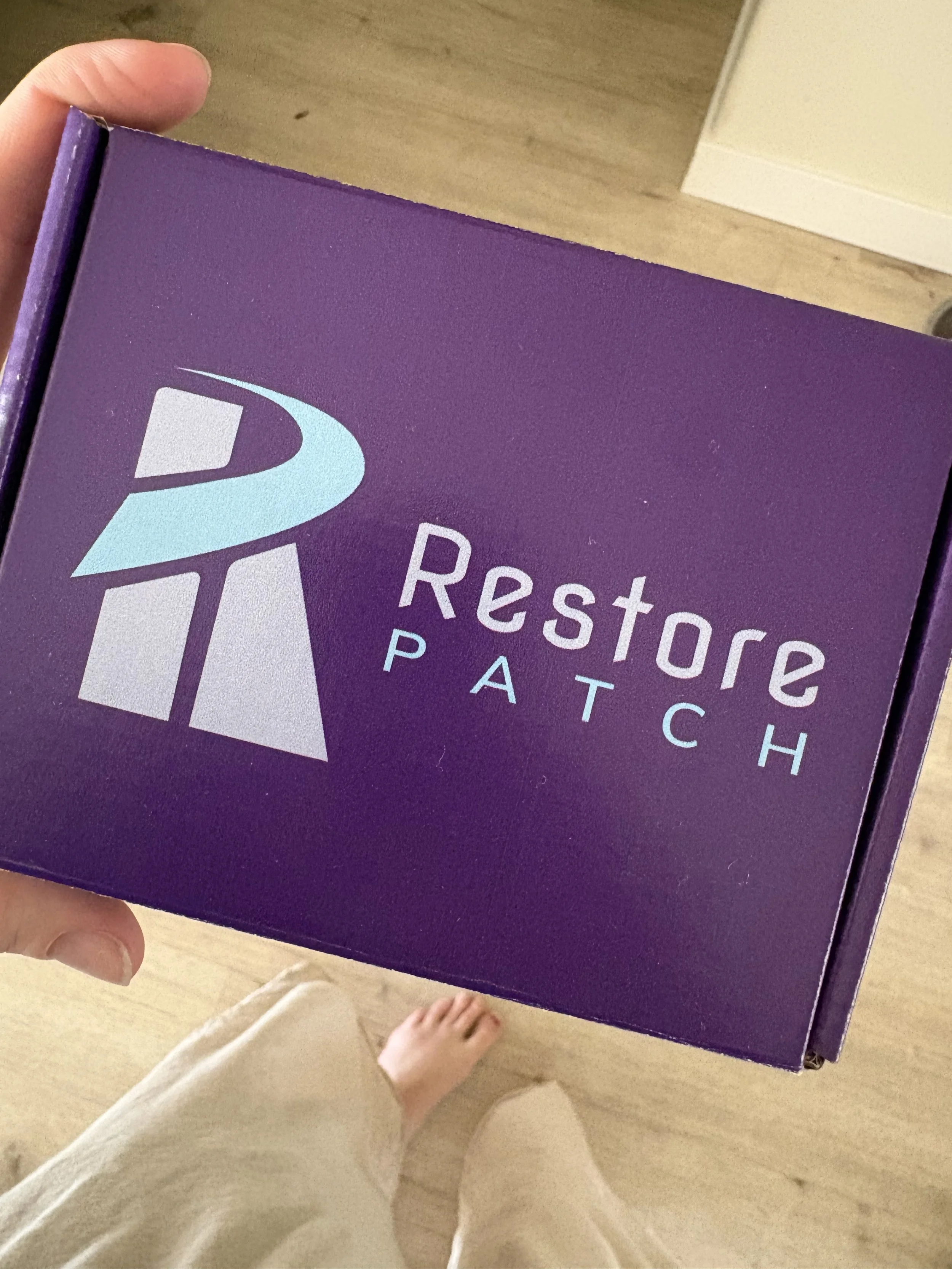8 Harmful Ingredients to Avoid in Your Deodorant (and my FAVORITE clean options!)
Curious about the ingredients in your deodorant?
This is the full post on what to avoid and why, some great natural deodorant alternatives, and the best tips for easing the transition!
When someone is first starting to minimize their exposure to toxins, deodorant is one of the first products I recommend switching out. This is because conventional deodorants are a personal care product that is often used on a daily basis, they are used right next to lymph nodes, and they are known to contain potentially harmful ingredients.
Some of the concerns include ingredients that are known endocrine disruptors (meaning they mess with your hormones!), known carcinogens (meaning they are associated with increased rates of cancer), or they are harsh to the skin and environment. This post will explore 8 common ingredients found in popular deodorants and the possible danger they present to your health.
I've mentioned it before on the blog, but I always want to cover these topics with the intent of educating. No need to live in fear of "toxins". But I do think it is important to be aware and informed. With that, let's dive in.
Deodorant Ingredients to Avoid
It can be so hard to decipher what’s what on an ingredient label. Some chemicals go by several different names! And others can be listed as a “group”. I have tried listing out several of the different names ingredients can go by so that the next time you’re shopping, you know what to look for 👀
Propylene Glycol
Propylene Glycol is an organic alcohol and harsh chemical that is popular in personal care products. The main concern with this ingredient is that it has been associated with a high risk for contact dermatitis (a fancy medical term for skin irritation), rashes, and itchiness.
When shopping for beauty and health products, it will show up on the ingredients list as one of these:
1,2- dihydroxypropane
1,2 - propanediol
2- hydroxypropanol
Methylethyl glycol
propane -1
2-diol
Propylene glycol
Synthetic Fragrance
Did you know that when you see the term “fragrance” on an ingredient label it is a generic term used for over 3,000 chemicals? According to the Environmental Working Group (EWG)- an organization that researches and tracks hazardous chemicals- 1 in 20 of these chemicals scored a high hazard score, 1 in 6 scored a moderate hazard score, and 25 scored a rating of 10- the highest, most concerning score. Some of these synthetic fragrances are known hormone disruptors, are irritating to the central nervous system, cause itchy skin, or are associated with an increased risk of cancer.
When reading an ingredient label, make sure you are avoiding this generic term and instead looking for brands that have ingredient transparency and use chemicals that have been researched and proven safe for human use. If you are unsure, you can look up home and beauty products on EWG.org to see the score they give popular brands and products. What I appreciate about this website (and their app Think Dirty) is that it tells you what and why there is concern with specific ingredients.
Many people suggest essential oils as an alternative to artificial fragrances. While this may be a better option than toxic chemicals, essential oils, and other natural fragrances may be poorly harvested, grown in a way that harms the environment, or broken down in the manufacturing process. Still, I think that is a much better option than something with artificial fragrance. Again-- just be aware and make the best-informed decision for you.
Aluminum
Aluminum salts are not necessarily in all deodorant ingredients, but in those that are also antiperspirant deodorants. The aluminum-based compounds are added to block your sweat glands and prevent the flow of sweat.
In animal studies, when mice were exposed to aluminum compounds, they developed large metastatic tumors in their breast tissue. In a human study, it was observed that women who used aluminum-containing antiperspirants and deodorants had higher rates of aluminum in their breast tissue as well as increased rates of breast cancer. This does not necessarily prove that the deodorant is the problem- the aluminum could be from other exposures. But it is something to be aware of and personally, I choose to avoid! Especially since there are so many great aluminum-free alternatives nowadays. Keep scrolling for a full list of my favorite brands!
Triclosan
This is an antibacterial chemical and one of the many synthetic preservatives. When your armpits smell, it isn’t necessarily from your sweat but the microbiome of bacteria on your armpits. Triclosan is added to minimize this bacteria and also prevent bacteria from growing on the deodorant. So, what's wrong with getting rid of bacteria? Well, it also can get rid of the good bacteria that is supporting your skin barrier.
Good news though! The FDA banned this ingredient back in 2016 because of hormonal effects and bacterial resistance. I think this is an important reminder that many of the chemicals that are approved today do not have long-term studies to prove their safety and efficacy and I’m sure we will continue seeing stricter guidelines on ingredients throughout our lifetime.
Phthalates
These are chemicals that are linked to endocrine disruption, higher risk of birth defects, reproductive toxicity, and cancer. They have been banned since 2020 in Europe, but are still allowed in the United States.
“Phthalates are linked in animal studies to birth defects of the male reproductive system, including undescended testicles, absent testicles, and a physical defect of the penis known as hypospadias, and are used in a wide range of beauty products including shampoo, hair spray, nail polish, deodorant, and lotion.” EWG
Sometimes phthalates will be on a list of ingredients as one of the following acronyms:
- DCP (dibutyl phthalates)
- DMP (dimethyl phthalate)
-DEP (diethyl phthalate)
-DEHP (Di(2-ethylhexyl)phthalate)
-BzBP (benzylbutyl phthalate)
-DBP (dibutyl phthalate)
-DNOP (di-n-octyl phthalate)
-DiNP (diisononyl phthalate)
-DiDP (dodecyl phthalate)
-DnHP (di-n-hexyl phthalate)
Diethanolamine
Also known as DEA, this chemical is a known carcinogen. It has also been shown to affect sperm structure and the sperm’s ability to fertilize an egg.
This chemical will be on an ingredient list under one of the following names:
2,2'-DIHYDROXYDIETHYLAMINE
2,2'-IMINOBISETHANOL
2,2'-IMINODIETHANOL
DEA
DIETHANOLAMINE
ETHANOL
2,2 IMINO BIS
N, N-DIETHANOLAMINE
Butane
These are found in spray-on, aerosol deodorants, and antiperspirants and are known carcinogens. According to the National Cancer Institute exposure to these aerosolized chemicals in health and household products increases your risk of developing leukemia and other blood cancers specifically.
It may also be seen as “N-BUTANE” on an ingredient list.
Parabens
Parabens are a common ingredient in many cosmetic products used as a preservative. Parabens have been shown to mimic estrogen in the body which can cause reproductive issues in both men and women and increase the risk of certain cancers. They can also be irritating to the skin and associated with skin conditions like eczema, redness, and sensitive skin.
These are some of the top names they may be under on an ingredient list:
- Methylparaben
-Propylparaben
-Butylparaben
-Ethylparaben
How To Switch to Natural Deodorant
I won’t lie- there is definitely a transition when starting to use natural deodorants. Most people are used to the strong fragrance and even more so, the antiperspirant effects. When starting to use natural, aluminum-free deodorant you may notice more body odor and sweating. Here are some of my favorite tips for easing the transition to natural deodorants:
Wear natural fabrics- these allow your skin to breathe and won’t trap moisture against your skin like synthetic fabrics do
Doing a quick armpit rinse throughout the day
Taking a high-quality probiotic- this will help regulate the odor-causing bacteria within the microbiome of your armpit
Armpit detox- using bentonite clay and apple cider vinegar mask can help to neutralize armpit odor and pull out any heavy metals blocking your sweat glands. (Heads up, the clay with harden and create a “pulsing” feel. If you have sensitive skin try mixing the mask with water instead of ACV and only leave it on for 5-10 minutes to prevent irritation. Read a step-by-step guide on the armpit detox!)
Quality natural deodorant that works! - over the years, I have tried many “natural” deodorants… that honestly, stunk 😜 but I promiiiise, there are great ones!
Related Reads:
My Favorite Natural Deodorant Brand
I have tried soo many different deodorants with natural ingredients. Some have done nothing for body odor, some have left me with skin irritation, and some have been hard to apply. This is the ultimate tried and true list of the non-toxic deodorants I have used for years. (These are also great options for sensitive skin deodorant because-- HI 👋 that's me!)
Primally Pure - my go-to brand for all non-toxic skin and body products! And their deodorant is no exception. With other natural deodorants, I have experienced redness and irritation if the formula contains baking soda. Thankfully, Primally Pure uses a finer-grain powder, which allows for a more gentle application. I have been using this brand consistently for years. I am often trying new brands and products to share and review on this blog, but I consistently return to Primally Pure products because they work.
This Vanilla Citrus scent is my absolute faaavorite— and even stood up to that postpartum breastfeeding BO (IYKYK 😅)
As of this month, they officially carry deodorant without any baking soda for those with extra sensitive skin. If you are just starting to use a natural deodorant and your underarms are feeling like they need a little extra love, this is a great option to start with!
You can shop Primally Pure and save 10% with code KAELYN10 ✨
Final Thoughts
I am not a chemical purist. I do not believe that we need to live in fear of every ingredient that is "not natural". But I do think we have to be conscious consumers and advocates for our own health. In a single day, we are exposed to large quantities of chemicals, many that which we do not yet know the long-term effects of at a high dose. Make the best choices you can for your own health, prioritize your own research, and try to limit your exposure to potentially toxic ingredients when able.
Kaelyn
Related Reads:










What is self-care actually?? This post explores what actually supports our wellness.. and all ideas shared take 5 minutes or less 👏